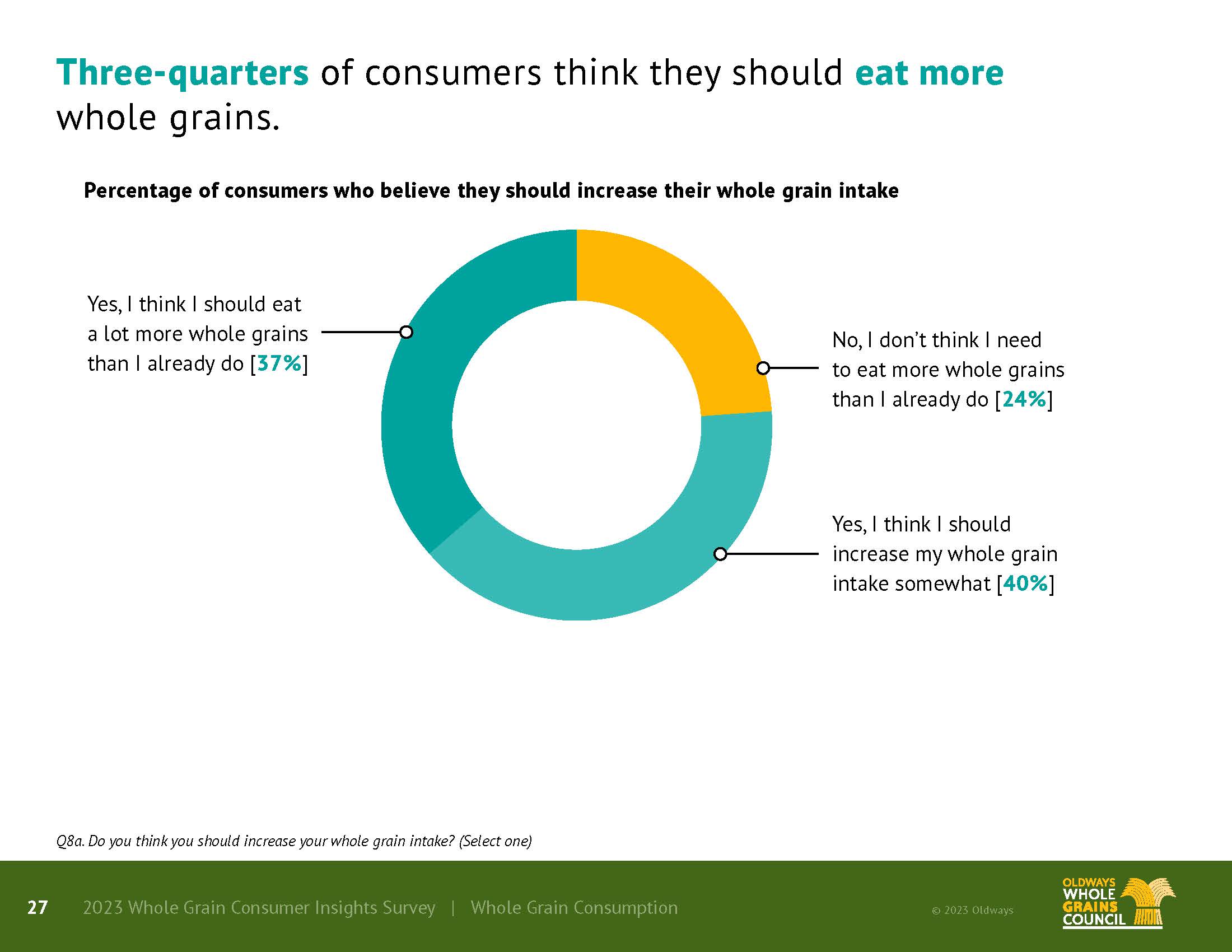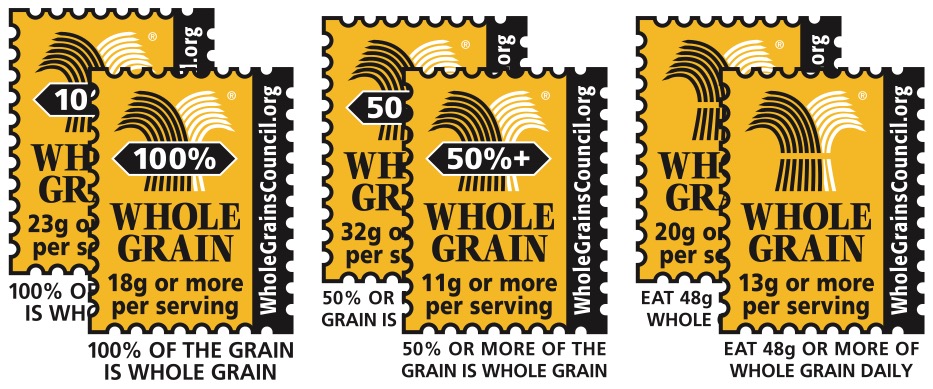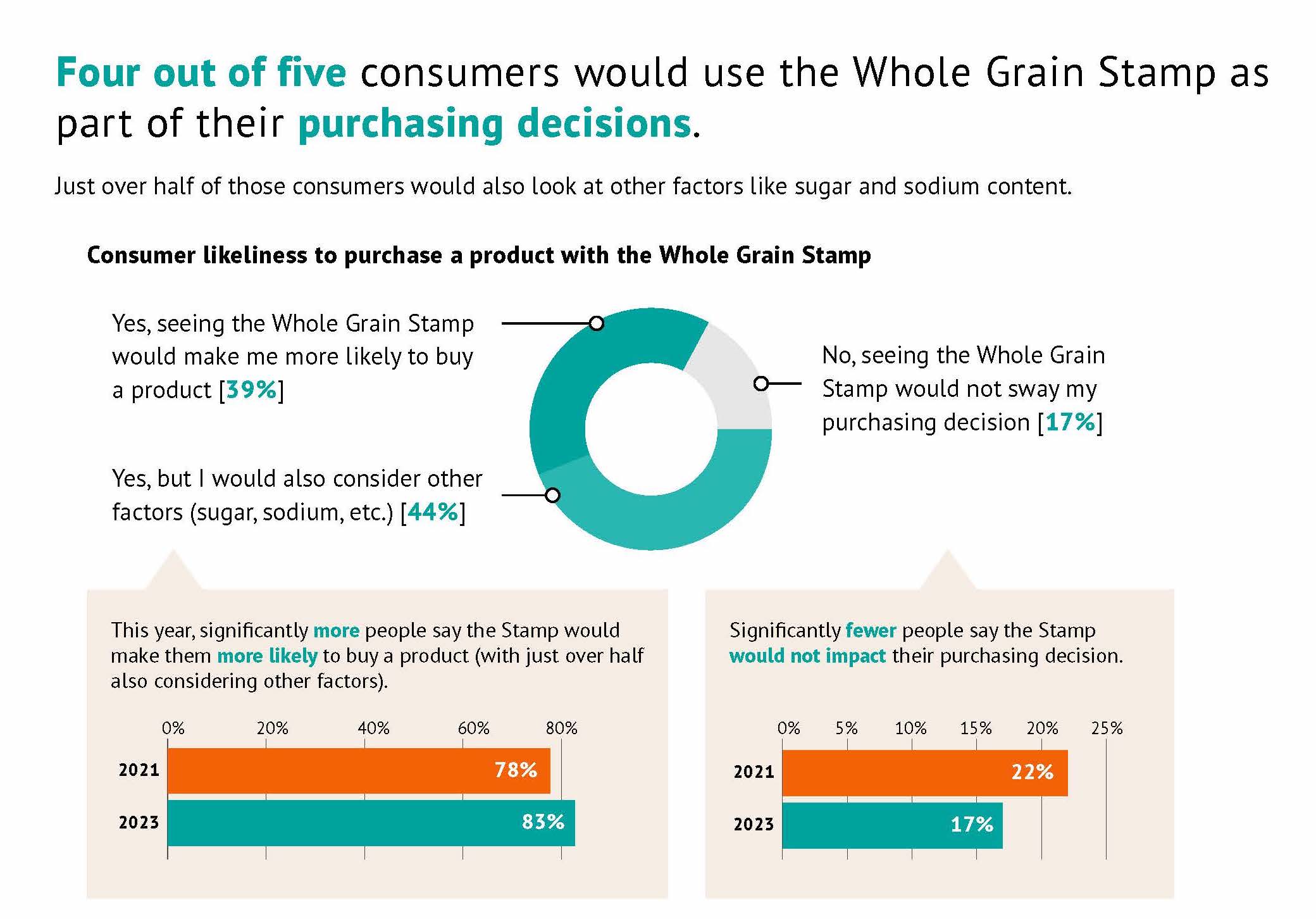More Than 75 Percent of Americans Think They Should Increase Their Whole Grain Intake, According to a New Survey From the Oldways Whole Grains Council
(Boston, MA) — The vast majority of American consumers (77%) say they think they should be choosing whole grains more often, according to a new survey from the Oldways Whole Grains Council. The 2023 Whole Grain Consumer Insights Survey found many indicators that consumers are increasingly seeking whole grain foods, not only for their health benefits, but also because consumers see them as tasty and sustainable.
Click here to view the full Survey Report!
The Oldways Whole Grains Council’s survey asked 1,500 American adults about their whole grain eating habits and perceptions. The findings show clear trends in consumer demand for whole grain products, in the roles that price and sustainability play in purchasing decisions, and in the trust that consumers place in third-party packaging symbols including the Whole Grain Stamp. Notably, this survey found that more than 33% of Americans say they have started eating more whole grains in the past five years, and 61% say they now choose whole grains at least half the time.
Trend #1: Consumers see the Whole Grain Stamp as the second-most useful packaging symbol, after the Nutrition Facts Panel.
With whole grain intake on the rise, consumers are increasingly turning to the Whole Grain Stamp as a trusted tool for identifying whole grain products. More than half of consumers say they’ve increased their whole grain intake over the past five years, but the vast majority (77%) also say they think they should be choosing whole grains more often.
It may be no surprise, then, that an increasing number of Americans (79% in 2023, compared with 70% in 2021) say they wish information about the whole grain content of products was included on product packaging. And with about two-thirds of consumers (64%) say seeing third-party packaging symbols gives them more confidence in the products they are purchasing, it’s clear that symbols like the Whole Grain Stamp are providing an essential tool to consumers, offering them both whole-grain content information and the piece of mind that comes with third-party certification.
Not only is the Whole Grain Stamp seen as one of the most useful package labels on the market (ranked second in utility after the Nutrition Facts Panel), but 85% of consumers say they trust the Whole Grain Stamp. This year, significantly more people say seeing the Stamp would make them more likely to buy a product (83% in 2023, compared with 78% in 2021), and more consumers say they would question a product’s whole grain claims if they didn’t see the Whole Grain Stamp (58% in 2023, compared with 51% in 2021).
Trend #2: Consumers, Especially Those in Younger Generations, Are Feeling More Sensitive to Food Prices
Inflation has caused food prices to increase at alarming rates over the past few years and consumers are feeling the effects. The percentage of consumers who cited the price of products as a major factor in their purchasing decisions rose this year, from 47% in 2021 to 51% in 2023. The survey also found that younger generations are much more likely to cite cost as a significant barrier to whole grain consumption (37% of Gen Z, 29% of Millennials, 27% of Gen X, 19% of Boomers, 13% of Silent Generation). Efforts to achieve price parity between whole and refined grain products may be more important than ever right now.
Trend #3: Diet Fads That Exclude Grains Are on the Decline
Fad diets that involve low- or no-carb eating patterns or that recommend avoiding gluten without a medical diagnosis appear to be on the decline. The survey found that fewer people say they are avoiding carbs (16% in 2023, compared with 18% in 2021), and among Gen Z and Millennial consumers the numbers are even lower – only 10% of these younger generations are avoiding carbs. Although one quarter of consumers told us they have cut back on gluten somewhat, 94% of people say they eat gluten some or all of the time. This year, significantly more people are not avoiding gluten at all compared to two years ago (70% in 2023, compared with 66% in 2021).
Trend #4: Millennials Lead the Way When It Comes to Shopping with Sustainability in Mind
Millennials are significantly more focused on the sustainability benefits of whole grains compared to other generations, with 24% of this group saying they choose whole grains for that reason (compared with 14% among Gen Z, Gen X, Boomers, and the Silent Generation). Millennials are more likely to choose foods that are environmentally sustainable and good for the climate (27%, compared with 23% of all consumers), and they are more likely to buy organic food (32%, compared with 23% of all consumers). Three-quarters of Millennials (72%) say they think of whole grains when they think of foods that are sustainable and environmentally friendly.
Methodology
Results were derived from online surveys of 1,500 Americans, ages 18 to 89, commissioned by the Oldways Whole Grains Council and conducted by Prodege, LLC. The population surveyed was nationally census-representative for age, gender, race/ethnicity, region, and income. Of all respondents, 73% reported that they are the primary food purchaser for their household and 27% make about half the food purchasing decisions for their household. The survey was conducted from May 23 — June 7, 2023.
About the Oldways Whole Grains Council
The Oldways Whole Grains Council (WGC) has been working since 2003 to increase consumption of whole grains for better health, and in 2005 introduced the Whole Grain Stamp, now used on more than 13,000 products in 65 countries. The WGC’s many initiatives help consumers to find whole grain foods and understand their health benefits; help manufacturers and restaurants to create delicious whole grain foods; and help the media to write accurate, compelling stories about whole grains. Find out more at http://www.wholegrainscouncil.org.
About Oldways
Oldways is a food and nutrition education nonprofit dedicated to improving public health by inspiring individuals and organizations to embrace the healthy, sustainable joys of the “old ways” of eating—heritage-based diets high in taste, nourishment, sustainability, and joy. Learn more at https://oldwayspt.org.
For press inquiries, contact: media@oldwayspt.org



